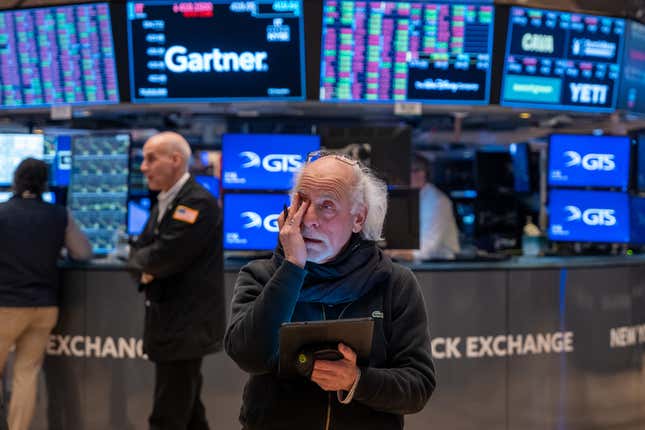Ahmed Riesgo, chief investment officer at financial services firm Insigneo, spoke with NYSE (ICE) TV for a special video interview.
Watch the interview above and check out the transcript below, which has been lightly edited for length and clarity.
KRISTEN SCHOLER: Ahmed, thanks so much for joining. What should we make of this market that has seen a lot of volatility of late and today is certainly heavy losses?
AHMED RIESGO: This is not totally unexpected. This is Trump’s negotiating style. He sort of wants to start off with a maximalist position. So we actually think, funny enough, that we could be near trade policy uncertainty, the peak of it. So I think going forward it’s very likely that trade tensions will dial down. Now the rate of that dialing down is what’s going to matter for investors and for markets.
KS: Well, certainly we’ve seen markets take it on the chin. We have seen signs of layoffs, announcements at certain companies in various sectors and companies will provide guidance starting next week when we kick off the earning season. From a reporting standpoint, how does corporate America respond to this disruption?
AR: Look, it has to respond. This amounts to what is essentially a massive fiscal shock to the U.S. economy. So he’s going to be bringing tariffs up to around 25%. This is the highest level we’ve seen in decades and much higher than what people were expecting. So this is like a massive tax hike on the economy, on corporations, on individuals. Now, the breakdown, it also matters what he does with those funds, right? If he turns around and gives it back as fiscal stimulus, that could help soften the blow, but we’re very likely to see decreased consumer spending going forward, increased prices. So it’s gonna definitely have an impact on the economy. I’ll put it to you this way. Before the announcement, we had recession odds sitting at around 35%. As of this morning we think it’s 50-50.
KS: Interesting. Now, I do wanna talk about the economy. The most close data that we’ll get of course is the jobs report tomorrow. Do we expect any of this disruption to show up in that particular report?
AR: Not yet. In fact, most of the hard jobs data we’ve been receiving has been quite strong and we expect that to follow through into the Friday print, but it’s really, going forward, what we’ll be closely monitoring. But given what’s happened today, I think that employment report on Friday takes on added significance because if it were to start showing signs of cracking, then that would probably keep the pressure on risk assets.

KS: We’ve already seen estimates of very low growth here actually in the first quarter. One recent estimate, according to a CNBC (CMCSA) survey, was just fractional gains when it comes to GDP growth, and earlier in the quarter we had actually seen the Atlanta Fed indicator point to negative growth. What are the chances we’re already in a recession?
AR: I think it’s about 50-50 to be quite honest right now. I think there’s a good chance that the first quarter GDP print will be approaching zero given some of the sort of weakness we’ve seen in soft data and beginning to see some of the hard data. But really, remember, recession is we need an extended period of contraction and that’s where we’re still about 50-50, but a very high chance that we see something near zero for Q1.
KS: Interesting. Consumer sentiment is an important factor here. The Fed Chair has called it soft data, but certainly consumer spending drives 70% of GDP growth. The jobs matter, the inflation matters, and we’ve seen consumers anticipate a weaker jobs market and higher inflation ahead. Does that coincide with tariffs or was that underway before the levy announcements from the president over the past several weeks?
AR: I think it correlates highly with tariffs. The problem with the consumption data, the soft data on consumption, is that lately it’s become very partisan, so if you actually break down the data by political party affiliation, Republicans are feeling a lot different about the economy than Democrats are. What that means overall is that the signaling power from consumer data is less than what it used to be.
KS: Interesting. Now Ahmed, is there any advice that you’re giving to your clients that our viewers could benefit in terms of how to navigate this market?
AR: Look, so I think in the short-term discretion is a better part of valor. You want to be in safe haven assets, you want to be in cash, Japanese yen, gold, those types of assets over the medium to longer term, six to 12 months. I think we’ll look back at this period and think, hey, that was sort of the peak of tariff and trade war uncertainty and I think investors six to 12 months from now will be sitting in a better spot.